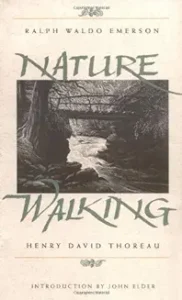Walking by Henry David Thoreau 1862
Thoreau’s classic essay on walking, published posthumously in 1862, was originally delivered as lectures over the 11 years before Thoreau’s death.
It begins by exploring the derivation of the word ‘saunter’ which Thoreau preferred to ‘walking’ since it carries more of the sense of moving without a specific goal. The derivation is from either sainte terrae, the Holy Land where the faithful walked in pilgrimage, or sans terre, a man walking because he is without a land.
Thoreau, in prose that is often quite lofty and complex, urges his fellow man to get out of the store, the office, the factory and walk and enjoy the sky, the air, the land, and the scenery. ‘In wildness is the preservation of the world’ is one of his most famous lines, and he applies it to the still unsettled areas of New England and most emphatically the West. He sounds like an American exceptionalist as he contrasts the new, America’s wilderness and wildness, with the old, settled, urban culture and life of Europe. He also presages Jared Diamond’s thesis of how societies disintegrate when they lose their forests, fields, soil, and water. He praises “useful ignorance’ over ‘useful knowledge’ urging man to pursue the new and unknown rather than the familiar. He also presages today’s mindfulness and meditation as he urges living in the present moment and leaving the daily cares of commerce and politics behind as one walks.
Thoreau lived his philosophy walking 3-4 hours a day and often more. He didn’t need to travel to Cape Cod, Mt. Wachusetts, or the other places which Ben Shattuck revisited. He could walk out his front door in Concord, MA and never repeat a walk within a radius of ten miles. He found areas in his neighborhood where “in one half hour I can walk off to some portion of the earth’s surface where a man does not stand for one year’s end to another, and where consequently, politics are not, for they are but as the cigar-smoke of man.”
All in all, this brief essay packed with wisdom and anticipation of many of today’s major thought trends in environmentalism is a fine addition to the bookshelf of ‘walking books’. It has also been an important influence on nature writing in the 150 years since Thoreau. In his introduction to this fine Beacon Press edition, John Elder writes that Thoreau was an important precursor for nature writers like Annie Dillard, Robert Finch, and Peter Mathiessen and others. Not bad for a Harvard grad who failed in his work as a pencil manufacturer and a surveyor.



